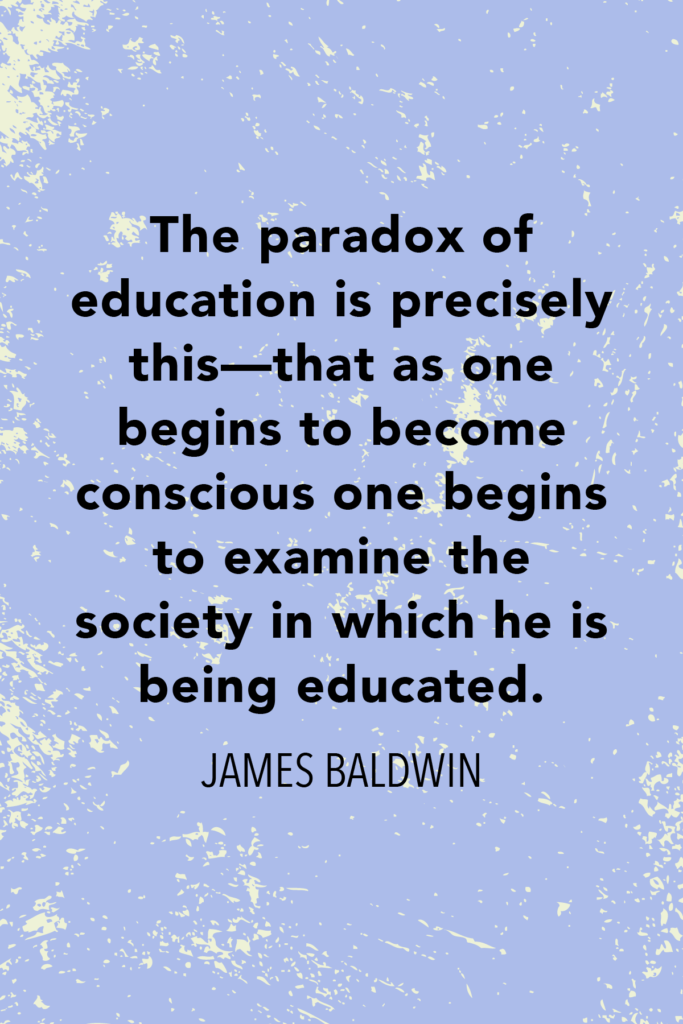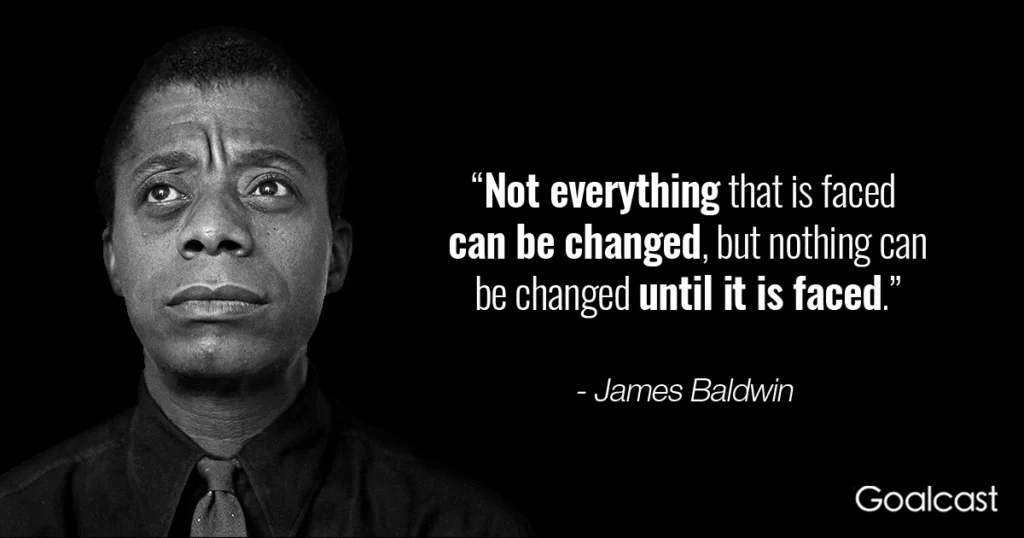Why James Baldwin’s Thought Is More Needed Now Than Before
James Baldwin’s Thought
The fundamental rights of minorities all over the world are threatened. “Ignorance is allying
with power to create the most ferocious enemy justice can have.” In the past, for the best or
the worst, it appeared that the minorities had the support of the western nations, especially of
the United States. Historically, the U.S. and its agencies were quick in lecturing, condemning, and even
punishing (through sanctions and violent destruction) the nations and leaders who tried to
destroy the lives of the vulnerable. Every year, it still releases reports to target countries like
Saudi Arabia, Syria, Russia, China, Iran, North Korea, Pakistan, India, Nigeria, and Eritrea to
label them as “countries of particular concern” as they threaten fundamental rights.
They scold and school the countries on equality and human rights but completely ignore the
realities of the minorities and the weak in America itself.
The United States today is struggling to live up to the mark. The promise of a free state is
breaking down. Every passing day, because of its deafness to the plight of its minorities, it is
destroying its position to lecture others. No matter what the American media and its
politicians argue, gun violence, misogyny, racism & white supremacy, and brutal
discrimination in schooling, banking, housing, employment, and criminal justice systems are
a harsh reality in today’s America. In fact, it has been a reality from the past hundreds of
years. The U.S. every time tried to brush it under the carpet, but it is high time that it realizes that
one cannot sort out the world’s problems while their own house is burning to shackles.

Starting with the police snatching of the most basic right of a man, the right to life, away from George
Floyd, the man who uttered “I can’t breathe” 27 times in his final moments. Those were also
the last words of Eric Garner; an unarmed man brutally choked to death by a U.S. police
officer in 2014. In his final moments, he pleaded, “I can’t breathe,” 11 times. The stunning
visuals of police kneeling on their necks and choking them to death created a storm on social
media and gave rise to the Black Lives Matter movement. Their last words became an
expression of solidarity, and their death moved millions in the U.S who might have nothing
in common other than their sufferings. There are countless instances where innocent African
Americans were wrongfully prosecuted or even shot to death, and many of their families still
await justice. The U.S has failed to protect the rights of its own people and turned a blind eye
to the human rights violations on its land.
Recently the supreme court’s misogynistic decision to overturn Roe V. Wade was
shocking and bizarre. It is shocking because the apex court of the U.S, or the institution that
must guard human rights, decided to quash the fundamental rights of women, i.e., the
reproductive rights or the right to their own bodies. The court, which is the third pillar of
democracy, believed that motherhood could be enforced on women, and men in office should
decide whether a teenager should continue an unwanted pregnancy or not. That was bizarre
because it was happening in 21st century America.
The U.S. wakes up every day to the tragedies of Gun Terror. Innocent victims, especially
children as young as nine years old, lose their lives because the U.S. allows its people to go
on a rampage with guns. The recent incident involved an 18-year-old gunman entering a
school in Texas and killing 19 innocent children. The actions taken by the U.S Agencies are
minimal if not nothing.
So, the U.S itself is struggling with many such fundamental issues; and James Baldwin, one of the
most celebrated writers and one of the tallest figures of the U.S civil rights movement, whose
nuanced way of dealing with complex issues like racism, discrimination, homophobia, and
also the whole problem of ‘America’ might have a way forward for us. His works, ranging
from essays, novels, plays, and public speeches, had an eloquent reflection of his experience
as a black and gay man in America. His psychologically and socially clever works like
Go Tell It on the Mountain, Giovanni’s Room, Notes of a Native Son, Nobody Knows My
Name, and Another Country explored his pain and the struggle of black Americans, all while
emphasizing the power of Love and brotherhood. He played a pivotal role in the Civil Rights
Movement to intersect race, politics, and sexuality and explained the alienation felt by the
minorities living in America. His struggle for the rights of blacks and gays has brought the
American promise of equality and justice to the consciousness of millions. His manuscripts
and novels like Remember This House and If Beale Street Could Talk have been adapted into
award-winning documentaries and films.
First and foremost, he believed that the U.S. has a disturbing past, a past that is filled with
racial violence, slavery, and homophobia; he believed that we could not make America great
again because it was never great in the first place. He argued that “people are trapped in
history, and history is trapped in them,” and many such problems originated and continue
because of the segregated society. He explained that racism not only affects people of color
but also hurts white people, as every one of us is inseparably entangled in the same social
fabric. The problem of self-deception is the U.S. and its people not acknowledging this and
trying to brush it under the carpet. America is lying to itself about its past, which took away
the opportunity for people to introspect and think about others deeply.

Many try to blame these issues on politics, and it is a fact that politics are omnipresent. Its
role in fuelling white supremacy, misogyny, homophobia, xenophobia, racial violence, and
violence against minorities is inarguable, and lawmakers must act. But the politics and our problems are also reflections of our society and culture. Hence, the political and personal cannot be detached from each other, and he believed in political action but also placed his
trust in the individual thoughts and actions of people.
He said that people created psychological barriers between the outside world and their own
innermost thoughts, like a “dreadful, private labyrinth’ in which we become terminally lost.”
This made us incapable of confronting our true desires and beliefs, and we failed to recognize
our own vulnerabilities and fears. Because of this, we started projecting our anxieties onto
imaginary evils” like the black community, Muslims, women, LGBTQIA+ community, and
other minorities.
Such views of James Baldwin are as relevant in 2022 as they were in the 1950s and have
enormous potential to guide the solutions to many global issues where prejudice is combined
with xenophobia to attack minorities. The issues he dealt with like racism, homophobia,
xenophobia, the disillusionment of times, and the identity crisis are still rampant to this day.
For example, many white supremacists believe that identity depends on skin colour and that
African Americans are not Americans because of their colour. Something similar is
happening in many other countries, as the nationalists believe that the national identity of a
country’s people depends on religion. Baldwin thought this happened because of the identity
crisis and our struggle to find out who we are. When we look at the world trying to find our
identity, we tend to take it up from the others, i.e., the politicians or the founding fathers. But
Baldwin strongly argued that such identities are bound to fail because the world does not
grant identity to anyone; each person must find it for themselves.
One of the solutions he proposed to solve these problems is, to be honest, and trust in each
other’s kindness. He made Love the center of his philosophy. Baldwin is the embodiment of
love, courage, humility, passion, and absolute integrity. He believed that at the end of the
day, we all crave peace and Love; they are inspired by the wounds we all carry and the
tenderness we all crave. Baldwin’s ideals can become a potential solution for many problems
the U.S. and other countries are facing. But to apply Baldwin’s ideals, they must first listen to
his advice of stopping deceiving themselves as self-righteous and come out of the idealism
that never existed in the first place. The U.S. must acknowledge the legacy and the
continuance of many of such issues and the resulting violations of basic human rights. It must
confront the horrors it faces as a collective, and instead of finding more ways to segregate
itself, it must emphasize what they have in common, through the American
promise and the love that lies deep within.


